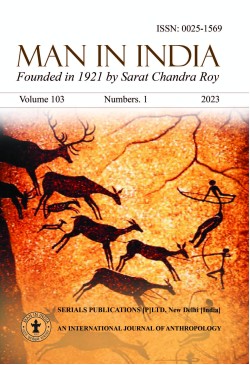
Man in India
Frequency :Quarterly
ISSN :0025-1569
Peer Reviewed Journal
EDITORIAL
ASSOCIATION BETWEEN SOCIO-ECONOMIC AND DEMOGRAPHIC VARIABLES AND AWARENESS-LEVEL RELATED TO ANTENATAL CARE (ANC) SERVICES AMONG REPRODUCTIVE-AGE WOMEN IN SOUTH SIKKIM, INDIA
Antenatal care (ANC) services are critical to lowering the global maternal mortality rate since a woman dies every minute from pregnancy-related problems and childbirth. The main problems that prevent women from using ANC services in our nation are a lack of education and awareness among women regarding ANC services. The present investigation aimed to determine the association between socio-economic variables and knowledge and awareness related to ANC services among women in South Sikkim, India. The community-based cross-sectional study included 250 reproductive-aged (15-49 years) women from a remote area in South Sikkim, India. A pre-structured interview schedule was used to collect data on knowledge and awareness of ANC services, as well as socio-economic and demographic factors, through household visits. A total of 79.2% of respondents reported being aware of and knowledge and awareness about ANC related services. Certain socio-economic and demographic variables, such as maternal age, age at marriage, age at first pregnancy, marital status, family size, husband education, husband occupation, family income, and parity, were found to have significant associations with knowledge and awareness levels of ANC related services (p<0.05) in the BLR analysis. Age, age at marriage, parity, and family income were revealed to have a significant association with knowledge and awareness level (p<0.05) in a stepwise multiple logistic regression analysis. Appropriate healthcare initiatives are required to deliver information and health education, enhance their awareness of ANC services, and strengthen community engagement and utilisation.
Keywords: Antenatal Care, Demographic Variables, Socio-Economic Variables, South Sikkim, Awareness, Association
NUTRITIONAL STATUS AND FEEDING PRACTICES OF SABAR TRIBAL CHILDREN IN BANKURA DISTRICT, WEST BENGAL, INDIA
Malnutrition is one of the acute problems among children. According to WHO, maternal health refers to the health of women, especially during pregnancy, childbirth, and the postnatal period. The present study shows the prevalence of malnutrition among 0-5 aged children who belong to the Sabar tribal community. This was accessed by anthropometric measurements, parenting, and feeding practices. Weight, height, chest circumference, and mid-upper arm circumference (MUAC) were measured. Data were analyzed by calculating HFAZ, WFHZ, WFAZ, and PI. According to the MUAC range, age and sex-specific nutritional status of the study population indicates that 47.06% of boys and 52.94% of girls were in the category of severe or acute malnutrition. The highest number of girls were severely malnourished. Boys were more stunted (HFAZ ? -2SD) while girls were more underweight (WFAZ ? -2SD) compared to boys. Maternal educational status, occupational status, and feeding practices are significantly associated with malnutrition.
Keywords: severe malnutrition, mother, BMI, child, Z score, health, tribal
EVOLUTION OF CHAKMA ETHNICITY- A SOCIOLOGICAL STUDY
The present study focuses on Chakma ethnic group who were dislocated from their original habitat, and constitute as a distinctive ethnic group in Arunachal Pradesh. Due to constant opposition from all sections of the society, the Chakmas in Arunachal Pradesh find themselves in the midst of uncertainty and hopelessness as they have been politically, economically and socio-culturally been deprived of accessing resources from the state government as they are considered as ‘outsiders’ or ‘foreigners. They have been staying in Arunachal Pradesh for more than five decades without any legally sanctioned civil, economic and political right owning to their Statelessness. The continued discrimination and harassment faced by Chakmas over the years have contributed to the evolution of Chakma ethnic consciousness, which resulted in the growth of ethnic conflicts between them and other tribal groups in the state.
Keywords: Foreigners, Outsiders, Statelessness, Ethnic and Other tribal groups.
REVIEW OF POLITICAL PARTICIPATION AND EMPOWERMENT OF DEPRESSED CLASSES IN BIHAR: A SYNOPTIC UNDERSTANDING
This article is an effect to unveil synoptic understanding of political participation and empowerment of Dalits in Bihar. The article will primarily figure out political consciousness and awareness of Dalits, (Scheduled Castes), their political participation with others and their political status regarding socio-political hierarchy in the state level. In this regard, it will focus on how political participation has brought a sense of empowerment in terms of their power-sharing and access to the decision-making process through their participation especially in the state level political organizations mainly on reserved seats.
Keywords: Dalits, Political Consciousness, Empowerment, Political Participation, Decision Making.
THE BREAKTHROUGH: DALIT WOMEN WRITERS AND SOCIAL REFORMATION
The origins of Dalit literature are revealed to be a revolution and a struggle to bring about socio-economic change along with the ontology-based establishment of a Dalit identity in society. It elaborates on various facets of the true meaning of Dalit literature. Therefore, Dalit literature aims to dismantle the conventional, reactionary, and conservative attitude associated with the downtrodden sector -the Dalits of India. Many different and distinctive philosophies exist that emphasis women's dominance, their marginalisation, and their drive for freedom owing to the "dissimilarity" in their communal, political, and educational contexts. Though feminism has been recognised as an ideology with global significance, the vitality of various feminist groups is handled in multifarious social and enriching contexts in a variety of ways. This paper envisages an overview of Dalit literature and proposes to see how far the female Dalit authors’ contribution to literature has created paths for modification of current trends.
Keywords: Dalit Identity, Marginalization, Conventionalism, Conservatism, Communalism, Feminist, Social Issues, Dalit Literature, Untouchable
BOOK REVIEW